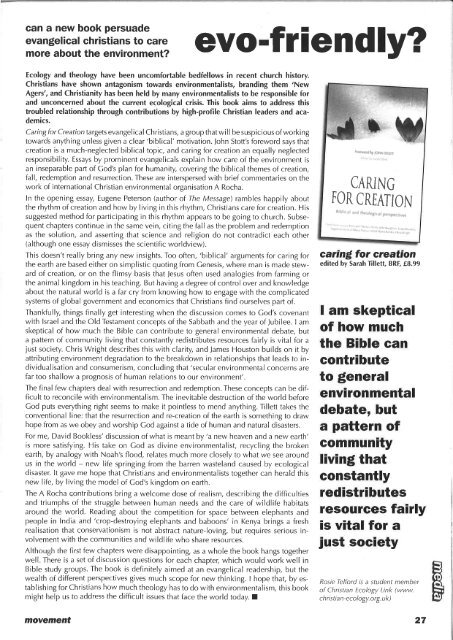Movement 123
You also want an ePaper? Increase the reach of your titles
YUMPU automatically turns print PDFs into web optimized ePapers that Google loves.
can a new book persuade<br />
evangelical christians to care<br />
more about the environment?<br />
evo-friendly?<br />
Ecology and theology have been uncomfortable bedfellows in recent church history.<br />
Christians have shown antagonism towards environmentalists, branding them 'New<br />
Agers', and Christianity has been held by many environmentalists to be responsible for<br />
and unconcerned about the current ecological crisis. This book aims to address this<br />
troubled relationship through contributions by high-profile Christian leaders and academics.<br />
Caring for Creation targets evangelical Christians, a group that will be suspicious of working<br />
towards anything unless given a clear 'biblical' motivation. John Stott's foreword says that<br />
creation is a much-neglected biblical topic, and caring for creation an equally neglected<br />
responsibility. Essays by prominent evangelicals explain how care of the environment is<br />
an inseparable part of God's plan for humanity, covering the biblical themes of creation,<br />
fall, redemption and resurrection. These are interspersed with brief commentaries on the<br />
work of international Christian environmental organisation A Rocha.<br />
ln the opening essay, Eugene Peterson (author of The Message) rambles happily about<br />
the rhythm of creation and how by living in this rhythm, Christians care for creation. His<br />
suggested method for participating in this rhythm appears to be going to church. Subsequent<br />
chapters continue in the same vein, citing the fall as the problem and redemption<br />
as the solution, and asserting that science and religion do not contradict each other<br />
(although one essay dismisses the scientific worldview).<br />
This doesn't really bring any new insights. Too often, 'biblical' arguments for caring for<br />
the earth are based either on simplistic quoting from Genesis, where man is made steward<br />
of creation, or on the flimsy basis that Jesus often used analogies from farming or<br />
the animal kingdom in his teaching. But having a degree of control over and knowledge<br />
about the natural world is a far cry from knowing how to engage with the complicated<br />
systems of global government and economics that Christians find ourselves part of.<br />
Thankfully, things finally get interesting when the discussion comes to Cod's covenant<br />
with lsrael and the Old Testament concepts of the Sabbath and the year of Jubilee. I am<br />
skeptical of how much the Bible can contribute to general environmental debate, but<br />
a pattern of community living that constantly redistributes resources fairly is vital for a<br />
just society. Chris Wright describes this with clarity, and James Houston builds on it by<br />
attributing environment degradation to the breakdown in relationships that leads to individualisation<br />
and consumerism, concluding that'secular environmental concerns are<br />
far too shallow a prognosis of human relations to our environment'.<br />
The final few chapters deal with resurrection and redemption. These concepts can be difficult<br />
to reconcile with environmentalism. The inevitable destruction of the world before<br />
God puts everything right seems to make it pointless to mend anything. Tillett takes the<br />
conventional line: that the resurrection and re-creation of the earth is something to draw<br />
hope from as we obey and worship Cod against a tide of human and natural disasters.<br />
For me, David Bookless' discussion of what is meant by 'a new heaven and a new earth'<br />
is more satisfying. His take on Cod as divine environmentalist, recycling the broken<br />
earth, by analogy with Noah's flood, relates much more closely to what we see around<br />
us in the world - new life springing from the barren wasteland caused by ecological<br />
disaster. lt gave me hope that Christians and environmentalists together can herald this<br />
new life, by living the model of Cod's kingdom on earth.<br />
The A Rocha contributions bring a welcome dose of realism, describing the difficulties<br />
and triumphs of the struggle between human needs and the care of wildlife habitats<br />
around the world. Reading about the competition for space between elephants and<br />
people in lndia and 'crop-destroying elephants and baboons' in Kenya brings a fresh<br />
realisation that conservationism is not abstract nature-loving, but requires serious involvement<br />
with the communities and wildlife who share resources.<br />
Although the first few chapters were disappointing, as a whole the book hangs together<br />
well. There is a set of discussion questions for each chapter, which would work well in<br />
Bible study groups. The book is definitely aimed at an evangelical readership, but the<br />
wealth of different perspectives gives much scope for new thinking. I hope that, by establishing<br />
for Christians how much theology has to do with environmentalism, this book<br />
might help us to address the difficult issues that face the world today. I<br />
foraord by jOHN SfOn<br />
CARING<br />
FOR CREATION<br />
Bil)liril and rheologir al perspective(<br />
. ,<br />
ri, .,rr-:,rL.L:.<br />
caring for creation<br />
edited by Sarah Tillett, BRD €8.99<br />
I am skeptical<br />
of how much<br />
the Bible can<br />
contribute<br />
to $eneral<br />
environmental<br />
debate, but<br />
a pattern of<br />
community<br />
living that<br />
constantly<br />
redistributes<br />
lesoutces fairly<br />
is vital for a<br />
just society<br />
Rosie Telford is a student member<br />
of Christian Ecology Link (www.<br />
ch r i sti a n -eco I ogy. o r g. u k )<br />
l. ";|-rr<br />
B<br />
movement 27

















